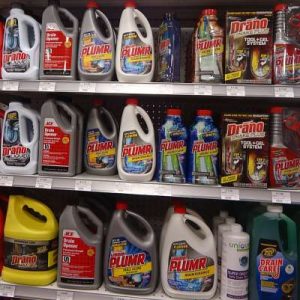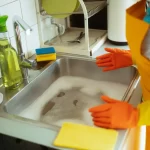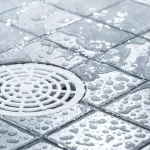You have a blocked drain, now what should you do? There are few things in the world, or at least certainly in your home, quite as annoying as a blocked drain. It can bring everything to a halt, from making dinner to shaving to being able to properly clean up. Plugged drains are the absolute worst, but that doesn’t mean there are quite a few ways to get them flowing again. Here are just a few simple and easy solutions for blocked drains in your Toronto home.
Chemical Drain Cleaners

A selection of chemical drain cleaners
Probably the most popular form of drain de-plugging, as it were, is getting out the drain de-clogging chemicals. These come in a number of different names, but they all do generally the same thing: they aggressively break down whatever is blocking your drain. Chemicals are one of the simplest solutions, all you have to do is pour some of it down the drain, wait, and repeat, but it can also be potentially the most harmful. The powerful acidic compounds in these chemical solutions can actually wear away at the pipes in your home’s plumbing system, causing early degradation that can lead to early replacement.
The “Science Experiment” Solution
Do you remember when you were young and someone mixed baking soda and vinegar together? It bubbles up and foams almost immediately, and makes for quite the show for any young minds fascinated by science. It turns out that solution is great for clogged pipes as well, since the light acidity and bubbling effect can break down whatever’s causing the problem. Simply pour a healthy amount of baking soda down the drain. Plug the other drain if it’s a double sink, get the plug ready and pour some simple white vinegar down the sink. Quickly plug the drain, wait about ten minutes, and follow it up with some boiling hot water.
While some people swear by this solution, others suggest it’s nothing more than oxygen and water.
Clogged drains can be a major inconvenience, disrupting your daily routines and causing potential damage to your plumbing system. Fortunately, there are various methods to tackle this problem, ranging from simple home remedies to professional services. Here’s a comprehensive guide to help you address clogged drains effectively:
1. Boiling Water
How It Works: Boiling water can dissolve and dislodge minor clogs caused by grease, soap scum, or other organic materials. The high temperature of the water can help break down these substances and clear the blockage.
Steps to Use Boiling Water:
- Boil Water: Heat a kettle or pot of water until it reaches a rolling boil.
- Prepare for Safety: Ensure you’re wearing protective gloves and are cautious of potential splashes.
- Pour Water: Carefully pour the boiling water directly into the drain from a moderate height to maximize the impact. Pour slowly and steadily to avoid splashing.
- Repeat if Necessary: For stubborn clogs, you may need to repeat the process a few times.
When to Use: Boiling water is most effective for minor clogs caused by grease or soap scum. It may not work for more severe blockages or those caused by physical objects.
2. Plunger
How It Works: A plunger creates a vacuum seal that helps dislodge and push through clogs in your pipes.
Steps to Use a Plunger:
- Choose the Right Plunger: Use a cup plunger for sinks and a flange plunger for toilets.
- Cover the Overflow Hole: If you’re unclogging a sink, cover the overflow hole with a wet cloth to ensure a good seal.
- Plunge Vigorously: Place the plunger over the drain, ensuring it covers the drain completely. Push down firmly and pull up quickly, repeating the process several times.
- Check the Drain: After several plunges, check if the water drains properly. If not, you may need to try another method or call a professional.
When to Use: A plunger is effective for clogs near the drain opening and can be used for sinks, tubs, and toilets.
3. Baking Soda and Vinegar
How It Works: Baking soda and vinegar create a chemical reaction that helps break down organic matter and clear minor clogs.
Steps to Use Baking Soda and Vinegar:
- Pour Baking Soda: Add about 1/2 cup of baking soda directly into the drain.
- Add Vinegar: Follow with 1/2 cup of white vinegar. You should see fizzing and bubbling as the chemicals react.
- Let It Sit: Allow the mixture to sit in the drain for 30 minutes to an hour.
- Flush with Hot Water: After the waiting period, flush the drain with hot water to clear out any remaining debris.
When to Use: This method is effective for minor clogs and odors but may not work for more severe blockages.
4. Drain Snake
How It Works: A drain snake, or auger, is a tool designed to reach deep into pipes and break up or remove clogs that are otherwise inaccessible.
Steps to Use a Drain Snake:
- Insert the Snake: Feed the end of the snake into the drain and turn the handle to extend it into the pipe.
- Break Up the Clog: Continue turning the handle as you push the snake through the pipe. The auger’s coiled end will help break up or hook onto the clog.
- Retrieve the Snake: Once you feel resistance or have broken through the clog, carefully pull the snake out of the drain.
- Flush with Water: Run hot water through the drain to ensure the blockage is fully cleared.
When to Use: A drain snake is ideal for more stubborn clogs that cannot be cleared with home remedies or plungers.
5. Get the Professionals
Why Professional Help May Be Necessary: If home remedies and tools fail to clear the clog, or if the clog recurs frequently, it’s time to call in a professional plumber.
Benefits of Professional Plumbing Services:
- Comprehensive Inspection: Professional plumbers can inspect your plumbing system thoroughly to identify the cause of recurring clogs.
- Advanced Tools: They use specialized equipment like motorized augers and video inspection tools to diagnose and address the problem.
- Preventative Measures: Professionals can provide recommendations for maintaining your drains and preventing future issues.
Choosing the Right Plumber:
- Check Qualifications: Ensure the plumber is licensed, certified, and has good reviews from previous customers.
- Get Estimates: Obtain quotes from multiple plumbers to ensure you’re getting a fair price for the services.
Conclusion
Addressing clogged drains effectively involves a combination of DIY methods and professional assistance when needed. Boiling water, plungers, baking soda and vinegar, and drain snakes are useful tools for dealing with minor blockages. For persistent or severe clogs, professional plumbers offer comprehensive solutions and expertise to restore your plumbing system to optimal function. By understanding and utilizing these techniques, you can keep your drains clear and avoid future plumbing issues.






